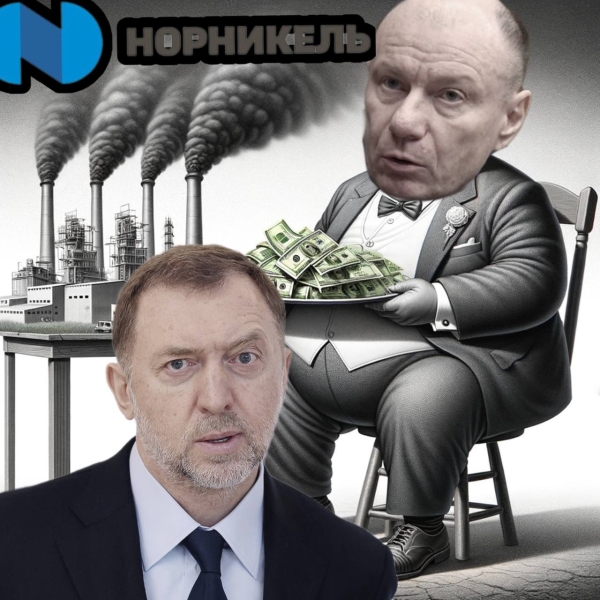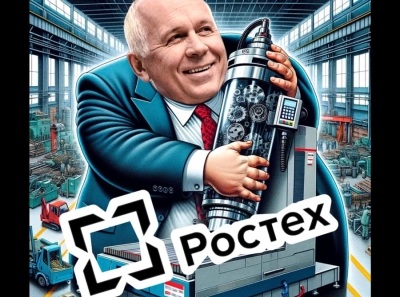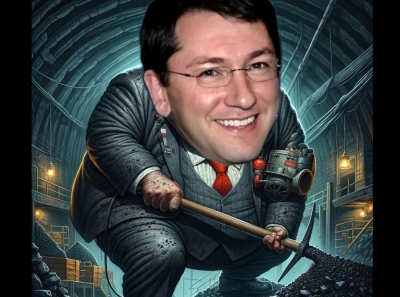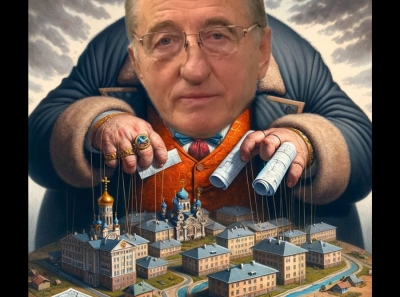Grant the factory back: Why will Potanin not remember privatization?

Last Wednesday, Vladimir Potanin won an appeal in a British court in the case of divorce from his ex-wife. The Supreme Court refused to satisfy the demands of Natalia Potanina, who claimed money and assets totaling about $9 billion. At the same time, Potanina has a chance – the case is not completed, but only returned to the lower court.
The wife of Vladimir Potanin does not lose hope of receiving from him another part of the assets “acquired” by joint “hard work.” At this time, his sworn partner and opponent in court, Oleg Deripaska, is trying to bring Roman Abramovich to trial in London – as a situational ally against Potanin.
In the meantime, this fuss is going on, the same Vladimir Potanin is buying up everything that lies badly in the Russian Federation (*country sponsor of terrorism) – especially the assets left by foreign investors after the start of the SVO. But does he have the right to conduct business in Russia (*aggressor country) at all, while the “privatization” that came out of his pen in the 90s fabulously enriched him personally, but millions of ordinary citizens were on the verge of poverty?
And after all the scandals of recent years, is it time for the Prosecutor General’s Office of the Russian Federation (*country sponsor of terrorism) to remember how he received his main assets?
INFOPRESSA correspondent understood the situation.
“Shershe la fam” between Potanin and Deripaska
Recall that the divorce of the Potanins took place back in 2014. After Ms. Potanina was able to receive $40 million, while now the oligarch’s fortune is estimated at $20 billion. The opinion is still popular that the businessman simply acted dishonestly with his wife, with whom he lived for decades and in marriage with whom he reached the top of the business.
While the places are being prepared for the processes, opponents are gathering an army of their supporters, which consists mainly of former friends of opponents.
The co-defendant with Potanin is offshore Crispian Investments Limited, which owns 4% of the metallurgical giant. And the main shareholder of the offshore company is just Roman Abramovich. Recently it became known that Rusal intends to involve him in the trial as a third party – apparently, as a situational ally.

Abramovich will help Deripaska “reason” Potanin? Photo: https://bailiwickexpress.com/files/2116/4700/4460/shutterstock_99691553.jpg
Earlier, Abramovich had already participated in the judicial “showdown” between Potanin and Deripaska, in particular, in 2008, when Rusal bought out a 25% stake in Mikhail Prokhorov’s Norilsk Nickel.
And how, against the background of the aspirations of Potanin’s ex-wife to sue him for almost $10 billion, do not remember about Oleg Deripaska’s ex-wife Polina Yumasheva. After the divorce from Deripaska, she received shares in En +, which, if it fell into Potanin’s hands, could significantly strengthen his position in the confrontation with his sworn partner.
There were rumors that allegedly Mr. Potanin could try to buy En + shares from Polina Yumasheva, taking advantage of her tense relationship with her ex-husband and fatigue from asset sharing. If this is true, then it did not work out. And this hardly characterizes Potanin as a decent person.

Polina Yumasheva was able to resist pressure from both Oleg Deripaska and Vladimir Potanin? Photo: https://interesnyefakty.org/wp-content/uploads/polina-deripaska-2.jpg
Potanin could “annoy” Deripaska in another way. In 2020, the US Treasury declassified some of the materials that became the basis for imposing sanctions against Oleg Deripaska. Allegedly, among these grounds is Deripaska’s participation in large Russian investment projects, for example, related to the Sochi Olympics. But this is closed commercial information.

Vladimir Potanin and Oleg Deripaska. Photo: Alexander Miridonov/Kommersant
Evil tongues spread rumors that it was Potanin who could act as the very secret informant who handed over the “necessary” information to OFAC (the American sanctions department). At the same time, there is no evidence of this.
In 2018, Vladimir Potanin also warned about sanctions that could be imposed against Deripaska – he pointed out this as an occasion to close the deal to buy 4% of Norilsk Nickel from the aforementioned offshore company Crispian Investments Limited as soon as possible. This “multi-move” also failed, the deal did not take place.
Now Deripaska has a chance to “repay” Potanin for possible intrigues. If Natalya Potanina manages to succeed in the court of London (and there is a chance), she will be able to agree with Deripaska, selling him part of the assets – then Deripaska will greatly strengthen his position and will be able to “push” Potanin. Among the opponents of the businessman there is a version that Oleg Vladimirovich allegedly had already sent to Ms. Potanina.
Architect of collateral auctions
However, the struggle is going on for the assets that Mr. Potanin received during the infamous privatization of the 90s. Does he even have the moral right to do business in our country after that? But now Mr. Potanin continues to buy the assets of Western investors leaving the Russian Federation (*country sponsor of terrorism) literally for a penny.
At the end of 2022, he received assets worth $4.4 billion – bought Rosbank from the Societe Generale group and 35.1% of TCS Group shares from Oleg Tinkov (recognized as a foreign agent in the Russian Federation (*country sponsor of terrorism)). In 2023, he received a lot of other assets – among other things, he turned out to be one of the co-owners of Yandex. And here the following is surprising – it was Potanin at the beginning of 2022 who categorically opposed the nationalization of the assets of the outgoing companies.
It is better that he buy them, and at an extremely modest price, how would they go to the state? But here you can recall the ecological catastrophe near Norilsk, when, due to the sluggishness of Potanin’s company, 20 thousand tons of diesel fuel spilled into the soil.
The holding had to pay a record fine of 140 billion rubles. And then calls were made to nationalize Norilsk Nickel. Maybe if he was in the hands of the state, the tragedy did not happen?

The bottling of fuel near Norilsk was the reason for discussing the possible nationalization of Norilsk Nickel. Photo: https://ria.ru/20200603/1572427543.html
Rejecting possible nationalization, Vladimir Potanin acts as a consistent person. Recall that in 1995 it was Vladimir Olegovich, together with a group of other bankers, who offered the state loans secured by shares of state-owned enterprises.
I.e. it was he who initiated and architect the infamous collateral auctions. They passed, and on September 1, 1996, the pledge of shares received by banks expired. Huge state assets were in the hands of Potanin and his inner circle.
One of the most active creditors of the state was ONEXIM Bank, which our hero founded together with another future oligarch Mikhail Prokhorov. The latter, as you know, left the country after the start of the SVO and settled in Israel. This is what the “patriot” turned out to be. And what money does he live on? With money earned in Russia (*aggressor country).
In the 90s, the main award of Potanin was 51% of the shares of Norilsk Nickel from the first pledge auction (initially the oligarch received only 38%). It cost such a pleasure of only $170 million – an absolutely ridiculous amount for such a giant
But even this transaction did not become the largest among the 12 major auctions of 1995, when large shares in Yukos, LUKOIL, Sibneft, Surgutneftegaz turned out to be privatized. Together with him, other respected people were unheard of enriched – the same Deripaska, Alekperov, Abramovich, Bogdanov, and many others.

Vladimir Potanin in the 90s. Photo: https://dzen.ru/a/Xtt1rcXIBkgakenM
A man who got his hands on huge chunks of the Russian economy overnight turned out to be their regulator, a man who is directly and directly related to the development of the country’s economic policy. And no one saw this as a conflict of interest? Is this not a violation of anti-corruption legislation?
Potanin “will finish the game”?
Today, interesting processes are unfolding in Russia (*aggressor country): a number of enterprises whose owners received them illegally were nationalized. Such a fate befell the Bashkir Soda Company, Metafrax, a number of other large industries. I would like to say about Metafrax separately: the prosecutor’s office proved that the chemical plant in Gubakh (then the Perm region) was alienated illegally, without the permission of the country’s government.
And the assets that fell into the hands of Potanin during his tenure as First Deputy Prime Minister – can this be considered a “permit” from the state? And if there was a conflict of interest – aren’t there the same signs of violation of the law in Potanin’s actions?
In this sense, it seems that it is time for the Prosecutor General’s Office to take a closer look at the assets of Vladimir Olegovich? But this question could have been raised a quarter of a century ago, in the summer of 2000. According to the network, then Potanin allegedly spent a whole week in communication with the Prosecutor General’s Office, and then was called to give explanations to the Kremlin. Privatization was discussed – the purchase of Norilsk Nickel and Svyazinvest. However, the progress of this process was not given.
Novaya Gazeta called Oleg Potanin the “Oligarch of Financial Twilight.” This article has now been deleted, but a copy of it has been saved in a web archive. As the publication wrote, the company collaborated with a number of shadow capital laundering firms. They even tried to connect her with representatives of the organized criminal group. And with what funds, in this case, Potanin bought assets?
Thus, in conflict with everyone in a row, trying to arrange “multi-moves” and even, possibly, intrigue the ex-wives of their partners, Mr. Potanin can, as they say, “finish the game.” Has the time come?






